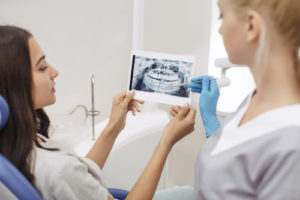The very phrase “impacted teeth” sounds painful, and it can be without proper care. Fortunately, the skilled and experienced team at Lovett Dental North Heights can ease your dental anxieties. Our team is not only highly capable but suited to creating a comfortable environment for individuals and families. Impacted teeth are usually wisdom teeth. However, any tooth in a patient’s mouth has the potential to become impacted. The ones most often impacted other than the wisdom teeth include the canine teeth (cuspids) and premolars (bicuspids).
What Are Impacted Teeth?
Impacted teeth do not emerge through the gum line in a manner or timeline as expected. When this happens, it is said that these teeth are impacted because they are trapped in between the patient’s jawbone and their gum tissue.
In most cases, an impacted tooth can be traced to one of two causes. For some patients, the issue is one of alignment. The tooth might not be aligned properly, so it cannot push its way through the gum line. Other patients might have an impacted tooth because of a lack of movement on the tooth.
Issues With An Impacted Tooth
 When a tooth does not erupt through the gum line as expected, there are often issues with the tooth itself. Those problems can extend to other teeth nearby if impacted teeth are not treated promptly for many patients.
When a tooth does not erupt through the gum line as expected, there are often issues with the tooth itself. Those problems can extend to other teeth nearby if impacted teeth are not treated promptly for many patients.
One of the most noticeable side effects of a tooth impaction for the patient is pain while biting, chewing, and/or opening their mouth. A patient might also experience difficulty opening their mouth, an unpleasant odor from their mouth, and a bad taste in their mouth as a result.
The gum tissue around the affected tooth can also swell and cause pain for the patient. This swelling and pain can leave the patient more susceptible to infection of the gum tissue.
The oral spaces that are near the impacted tooth can also be affected. An impacted tooth can form cysts and tumors that can destroy the bone and tissue, causing permanent damage.
Additional side effects that could occur if impacted teeth are not treated include:
- Cavities
- Absorption of nearby bone and teeth
- Decay
- Overcrowding
- Gum disease
Why Do Wisdom Teeth Become Impacted?
There’s a reason why impacted wisdom teeth are so common. Often referred to as “third molars,” wisdom teeth are usually the last set of teeth to develop before attempting to erupt through the gum line.
While some people have enough room along their jawline to accommodate their wisdom teeth, which are often larger and wider than other types of molars, there are many more people who aren’t as lucky. In other cases, the patient’s wisdom teeth might not be aligned correctly, allowing them to emerge through the gum line without issue.
Identifying Impacted Teeth
For patients who practice routine dental exams to protect their dental health, an impacted tooth is typically found during one of these exams. The advantage of maintaining schedule dental exams is that impacted teeth can often be identified before they start causing the patient pain, discomfort, and swelling.
In other instances, the patient might make an appointment with their dentist after experiencing pain, swelling, and discomfort. An x-ray provides the dentist with evidence of an impacted tooth.
Lovett Dental North Heights provides compassionate general dental services across multiple disciplines for patients, including impacted teeth removal. Our specialty services encompass the following six categories:
- Maxillofacial
- Endodontist
- Pediatric
- Surgical
- Periodontist
- Orthodontist
With an eye toward providing excellent dental and oral health care, Lovett Dental North Heights offers fillings, dental bonding, root canals, and addresses dental anxiety. Contact us today at 832-617-5531 to learn more about us or schedule an appointment for a free consultation.